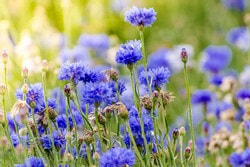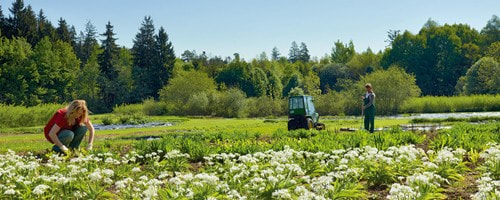


Medicinal and spice herbs count among the special cultivations, i.e. they need a particular high input of work and capital. Furthermore the farmer needs to know a lot about cultivation, harvest and after-harvest procedures (e.g. drying). In Germany, more than 100 species are cultivated in noteworthy extent. Important cultures are e.g. Camomile, Fennel, Peppermint and St. John's wort.
We have been purchasing an important part of our herbal drugs (dried plant and plant parts) from organic farming in Germany for many years. In future, we wish to ensure and extend our high ratio of organic herbs, which for the tea herbs is already more than 80%. Through our work in the field of cultivation and breeding, we are able to put at the farmers disposal appropriate seeds and seedlings (e. g. of the special Salus species) as well as the respective know-how, thus contributing to the provision of high quality raw materials.
The basic thought of organic agriculture means operating in harmony with nature. The farm is considered to be a "complete organism" with humans, animals, plants and the soil.
"An organism is an organized natural product in which every part is reciprocally end and means", Immanuel Kant
On the Salus testing fields cultivation starts, selection and breeding are realised. Cultivation is according to the EU-Eco-Regulation No. 834/2007.
Our aims for breeding can be classified into two groups:
Pharmaceutical aims: type and quantity of active principles or characteristic ingredients.
Cultivation aims: yield, habitat adaption, technical properties or tolerances against pathogens.
As breeding methods, mostly the positive and/or negative mass selection, set-up of inbreeding-lines and crossbreeds and backcross breeds are used. Great importance has the maintenance breeding and the propagation of seeds in order to stabilize the character and the properties of a breed.
Among the healing plants we use for our products, some are rare. Some species are even protected. So, in order to protect the wild habitats of the plants and at the same time assure a sustainable provision with raw materials, for many years we have been striving for the cultivation of wild plants. Arnica and Cowslip are two successful examples.
A cultivation start is more than just the planting of wild plants or seeds on the respective fields. It is a complicated process of adaption and selection of the plants the genetic potential of which allows optimal results at the respective location.